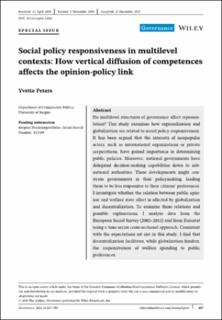Social policy responsiveness in multilevel contexts: How vertical diffusion of competences affects the opinion-policy link
Journal article, Peer reviewed
Published version

Åpne
Permanent lenke
https://hdl.handle.net/11250/2985565Utgivelsesdato
2021Metadata
Vis full innførselSamlinger
Originalversjon
Governance: An International Journal of Policy, Administration and Institutions. 2021, 34 (3), 687-705. 10.1111/gove.12482Sammendrag
Do multilevel structures of governance affect representation? This study examines how regionalization and globalization are related to social policy responsiveness. It has been argued that the interests of nonpopular actors, such as international organizations or private corporations, have gained importance in determining public policies. Moreover, national governments have delegated decision-making capabilities down to subnational authorities. These developments might constrain governments in their policymaking, leading them to be less responsive to their citizens' preferences. I investigate whether the relation between public opinion and welfare state effort is affected by globalization and decentralization. To examine these relations and possible explanations, I analyze data from the European Social Survey (2002–2012) and from Eurostat using a time-series cross-sectional approach. Consistent with the expectations set out in this study, I find that decentralization facilitates, while globalization hinders, the responsiveness of welfare spending to public preferences.
